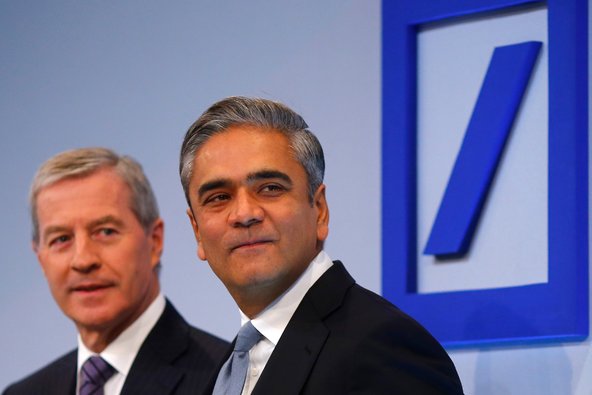 Kai Pfaffenbach/ReutersAnshu Jain, right, and Jürgen Fitschen, co-chairmen of Deutsche Bank.
Kai Pfaffenbach/ReutersAnshu Jain, right, and Jürgen Fitschen, co-chairmen of Deutsche Bank.
8:17 p.m. | Updated
FRANKFURT — Deutsche Bank, Germany’s largest bank, moved Monday to address criticism that it has too thin a cushion against risk, announcing that it planned to issue $3.65 billion in new stock to increase its capital reserves.
The bank had earlier resisted the move, which was first booed and then cheered by the stock market. The company also said that its first-quarter profit rose as cost-cutting offset a decline in revenue from investment banking.
Related Links
Since the 2008 financial crisis, banks have been under intense pressure from regulators to raise capital so they are better able to absorb shocks. Deutsche Bank has faced criticism for having too little capital compared with other banks its size.
The bank had been reluctant to issue new shares, which dilutes the value of existing equity, and instead sought to raise the ratio of capital to money at risk by selling assets or other measures. The bank did not immediately explain its change of course, but it is becoming increasingly clear that banks throughout Europe have little choice but to take steps designed to prevent future financial crises. Shareholders of Commerzbank, Germany’s second-largest bank, backed plans earlier this month to issue new shares.
“Banking has to become boring again,” Rüdiger Filbry, director of the German banking practice at the Boston Consulting Group, said during a meeting with reporters Monday, referring to the industry in general. “We expect significantly lower profits than we have seen in the past.”
 Hannelore Foerster/Getty ImagesDeutsche Bank’s headquarters in Frankfurt. The bank said net profit in the first quarter was $2.16 billion, up nearly 18 percent.
Hannelore Foerster/Getty ImagesDeutsche Bank’s headquarters in Frankfurt. The bank said net profit in the first quarter was $2.16 billion, up nearly 18 percent.
Deutsche Bank portrayed the share sale as the logical next step in a campaign to increase capital that began last year and has already made the bank safer. “Deutsche Bank ranks today amongst the best-capitalized banks in the world in our global peer group,” Jürgen Fitschen and Anshu Jain, co-chief executives of the bank, said in a statement.
Deutsche Bank, which has large operations in the United States, may also have been reacting to pressure from the Federal Reserve. The Fed has pressed foreign lenders to hold more capital at their local operating units to make sure that the American operations have the financial strength to absorb losses.
Banks also face a deadline to meet new global standards known as Basel III, which began taking effect this year. Deutsche Bank said the share sale and other measures would raise the ratio of capital to assets, as defined by the new rules, to 9.5 percent from 8.8 percent at the end of the quarter. That is comfortably above capital requirements that are being phased in through the beginning of 2019.
Deutsche Bank executives had earlier grumbled about the new rules, saying they were unnecessarily restrictive. Stefan Krause, the bank’s chief financial officer, said in a call with analysts in January that the rules “were really not very helpful in terms of helping global financial markets.”
On Monday, however, the bank said that it would issue 2.8 billion euros in new shares. The sale will increase the number of existing shares by about 10 percent and could reduce the size of the dividend that shareholders would otherwise receive. Deutsche Bank said it would sell the shares privately to institutional investors and would not sell them publicly.
Deutsche Bank shares fell about 2 percent in trading in New York before recovering and finishing up 3.7 percent, at $43.85.
Proponents of bigger capital buffers argue that they will ultimately benefit banks because the lenders will pay a lower risk premium to raise money on capital markets.
While Deutsche Bank avoided a direct government bailout — one of the few large German banks to do so — it continues to cope with fallout from the financial crisis as well as numerous legal scandals.
Those include a tax evasion inquiry that led to a raid on company headquarters in late 2012 involving hundreds of police officers who surrounded the bank’s high-rise headquarters in Frankfurt. Executives have also acknowledged that the bank could face additional lawsuits related to its sale of securities tied to the United States subprime mortgage market.
The German central bank is also said to be looking into accusations that Deutsche Bank hid billions of dollars in losses to avoid a potential bailout during the financial crisis. The investigation stems from accusations that Deutsche Bank understated the value of credit derivatives positions beginning in 2007 that were worth as much as $130 billion in so-called notional terms.
The bank has also been ensnared by the global investigation into rate manipulation. Last month, Deutsche Bank said it allocated an additional 600 million euros ($775 million) to cover its legal costs, a move that reduced its pretax profit for 2012 by the same amount.
News of the share sale initially overshadowed the bank’s earnings report. Net profit rose to 1.66 billion euros ($2.16 billion), up nearly 18 percent from 1.41 billion euros in the period a year earlier, Deutsche Bank said in announcing earnings a day earlier than previously scheduled.
Mr. Fitschen and Mr. Jain said in a statement that the earnings report “reflects the strength of our franchise in the face of continued regulatory challenges and cost efficiencies arising from our operational excellence program.”
Since taking over the bank last year, the two leaders have promised to cut back on risk-taking and address what they acknowledged were ethical lapses in the past. The bank said on Monday that it had reduced its assets, the total amount of money at risk, to 325 billion euros ($423 billion) at the end of the first quarter compared with 334 billion euros ($435 billion) at the end of 2012.
Much of the increase in profit came from cost-cutting. Deutsche Bank said it cut expenses not including interest by 370 million euros, to 6.6 billion euros.
Article source: http://dealbook.nytimes.com/2013/04/29/deutsche-bank-profit-rises-as-bank-plans-to-raise-new-capital/?partner=rss&emc=rss